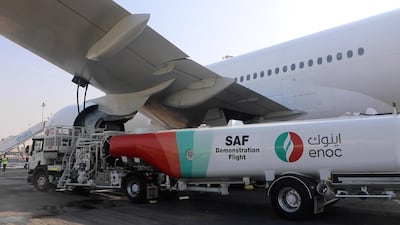Emirates, the world's biggest long-haul airline, has earmarked $200 million to fund research and development projects focused on advanced fuel technologies that can reduce commercial aviation's environmental impact.
The Dubai-based carrier will identify partnerships with major organisations working on these solutions and the funds will be disbursed over three years, Emirates said on Thursday.
“We looked long and hard at the reality we face in commercial aircraft and engine technology, fuel supply chain, and our industry’s regulatory and ecosystem requirements,” said airline president Sir Tim Clark.
“It’s clear that with the current pathways available to airlines in terms of emissions reduction, our industry won’t be able to hit net zero targets in the prescribed timeline.
“We believe our industry needs better solutions, and that’s why we’re looking to partner with leading organisations on R&D.
“Our aim is to contribute meaningfully to practical solutions for the long-term sustainability of commercial aviation.”
The fund is the biggest single commitment by any airline on sustainability, Emirates said.
In February, Chicago-based United Airlines said it launched a more than $100 million investment fund to support start-ups focused on the research and production of sustainable aviation fuel.
The global aviation industry is facing increasing pressure to reduce carbon emissions and find ways to meet the net-zero emissions by 2050 target set by the International Air Transport Association in October 2021.
The industry, which contributes about 2 per cent of global carbon dioxide emissions, faces major challenges in reaching that goal as technologies such as electric and hydrogen-powered aircraft are years away from becoming a reality.
Global airlines, plane-makers and engine-manufacturers are betting on SAF, which is made in small quantities from feedstocks such as cooking oils and can cost two to five times more than conventional jet fuel.
The challenge now is to increase the supply of SAF while lowering the cost. Iata estimates that the entire world’s annual supply of SAF meets less than 0.1 per cent of airlines’ needs.
In January, Emirates successfully completed a demonstration flight with one of two engines of the Boeing 777-300ER aircraft powered completely by SAF.
Emirates — the world's largest operator of Boeing 777 and Airbus A380 aircraft — is aiming for “SAF to make up half its total fuel supply by 2030”, its chief operating officer Adel Al Redha said in January.
This depends largely on regulatory certification and adequate supply of the alternative fuel at commercially viable prices, he added.
Finding advanced fuel and energy solutions for aviation is the area where airlines currently face the biggest impediment in reducing their environmental impact, Mr Clark said on Wednesday.
Until better environmental solutions can be found, Emirates will continue to implement green policies throughout its business, including using SAF where possible, ensuring efficient fleet operations and introducing fuel-efficient aircraft into its fleet, Mr Clark said.
“Our $200 million fund is earmarked for R&D, and not for operating costs like the purchase of SAF or carbon offsets to tick regulatory boxes — activities we consider business-as-usual,” he said.
Emirates’ Environmental Sustainability Executive Steering Group will oversee disbursements from the fund, with support from technical experts, the airline said.
The airline’s long-standing environmental policy and strategy focuses on three main areas: emissions reduction, responsible consumption and the conservation of wildlife and habitats, it said.
Emirates has a programme to reduce unnecessary fuel burn and emissions.
This includes working with air navigation service providers to create the most efficient flight plan for each flight, taking advantage of natural tailwinds, while avoiding headwinds and weather systems.
It also introduced fuel-efficient practices while the aircraft is on the ground such as the use of ground power units instead of the aircraft auxiliary power unit and switching one or two engines off while taxiing.
Emirates invests in renewable energy initiatives including the installation of solar panels to power some of its operational buildings in Dubai and the use of electric vehicles on airside and landside.


